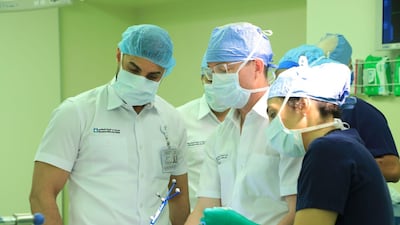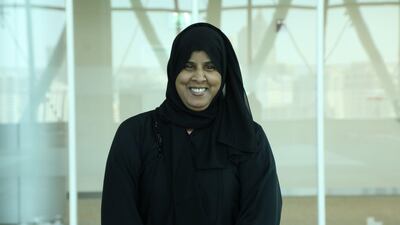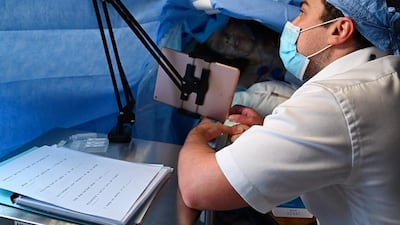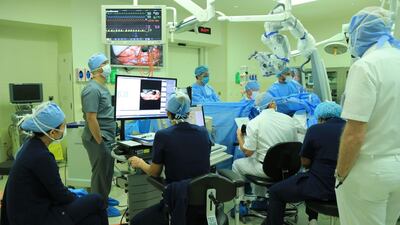An Emirati woman kept awake for four hours during brain surgery is recovering well and as a result of the procedure has stopped suffering epileptic seizures.
School bus supervisor Salha Al Dhaheri had a slow-growing tumour on her brain that was limiting her function, causing dizziness and regular seizures.
Surgeons at Cleveland Clinic Abu Dhabi took the unusual step of an awake neurosurgery to remove the tumour close to critical areas of the brain that controlled speech and other skills.
Ms Al Dhaheri, 31, was able to count backwards from 100, read sentences in Arabic and name objects to doctors, as surgeons operated on her exposed brain.
“It was a very surreal experience to see the doctors operate while also being awake and answering questions,” said Ms Al Daheri, who did not suffer during the surgery because brain tissue does not feel any pain.
“Now my issues of dizziness and seizures have stopped, and I can’t thank the doctors enough for this miracle.
“I am still undergoing rehabilitation, but my quality of life has improved drastically.
“I am looking forward to resuming my duties as a supervisor.”
Surgeons required Ms Al Daheri to remain conscious throughout the surgery so they could be sure the correct area of the brain was being treated.
The procedure lowered the risk of damage to functional areas of the brain that affect vision, speech and movement.
Neurosurgeons used high-definition 3D-rendered imaging sequences imported into a navigation device to map a safe pathway into the brain to locate the tumour, and prevent the likelihood of damaging healthy tissue.
A 3D printed model of her brain and the tumour was used to help doctors plan the surgery.
Because the tumour was located very close to the language and motor cortex of the brain, the patient’s responses allowed surgeons to locate and remove the growth more precisely.
Ms Al Dhaheri was unconscious as doctors approached the brain but then was fully awake while the neurosurgeon removed the tumour.
Questions were asked in Arabic, because replies in English would have triggered a different brain response.
A sheet of electrodes was applied directly on the brain to pick up epileptic activity, because a seizure during the procedure could have been catastrophic for the patient.
Although the surgery was the first of its kind completed in the UAE, three others have been performed since and two more are planned – all at the Cleveland Clinic Abu Dhabi’s neurological institute.
“Salha’s tumour was in one the most eloquent areas of her brain,” said Dr Florian Roser, the institute’s chairman.
“The same tumour removal on the right side would have been done in a sleeping state because there would be no risk of language loss, and therefore you do not need the patient to be awake.
“But you can only test language and higher cognitive functions when your patient is awake.
“When I saw Salha, I knew she would be an ideal candidate for awake surgery.”





